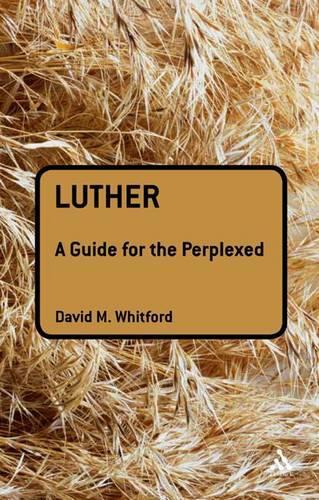
Luther: A Guide for the Perplexed
(Hardback)
Available Formats
Publishing Details
Luther: A Guide for the Perplexed
By (Author) Dr David M Whitford
Bloomsbury Publishing PLC
T.& T.Clark Ltd
25th November 2010
United Kingdom
Classifications
Tertiary Education
Non Fiction
284.1
Physical Properties
Hardback
192
Width 138mm, Height 216mm
356g
Description
This is an upper-level introduction to the German Reformer Martin Luther, who by his thought and action started the Reformation movement. Martin Luther was one of the most influential and important figures of the second millennium. His break with Rome and the development of separate Evangelical churches affected not just the religious life of Europe but also social and political landscapes as well. More books have been written about Luther than nearly any other historical figure. Despite all these books, Luther remains an enigmatic figure. This book proposes to examine a number of key moments in Luther's life and fundamental theological positions that remain perplexing to most students. This book will also present an introduction to the primary sources available to a student and important secondary works that ought to be consulted. Continuum's Guides for the Perplexed are clear, concise and accessible introductions to thinkers, writers and subjects that students and readers can find especially challenging - or indeed downright bewildering. Concentrating specifically on what it is that makes the subject difficult to grasp, these books explain and explore key themes and ideas, guiding the reader towards a thorough understanding of demanding material.
Reviews
Martin Luther is for the most part fascinating, sometimes annoying, and for many people perplexing: David Whitford provides an insight to the reformer's biographical context, his theological foundations and primarily his political theory. The basic nature of the content leads to an elementary understanding of Luther. At no point does Whitford evade discussing problems in Luther's theology, instead inviting discussion with him concerning his interpretation. The book should be read by beginners in Luther studies, taking their first steps, as well by scholars who seek a fresh look on Luther. -- Volker Leppin, University of Tbingen, Germany.
David Whitford's graceful new study does exactly what its title promises: guide readers who have only a vague notion of Martin Luther through his life, ideas, and key writings. The book explains complex theological issues in clear, but not overly simplistic, language, and does not avoid the controversies in which Luther was involved, many of which remain matters of debate today: Do humans have free will Does religion allow one to oppose the government How should Christians regard the Jews How should Christians regard-and treat--each other -- Merry E. Wiesner-Hanks, Department of History, University of Wisconsin-Milwaukee, WI, USA.
Venturing across centuries and continents to encounter great thinkers of the past always involves a cross-cultural experience, for which a guide is mandatory as we make the first trip. David Whitford takes twenty-first century readers without much background in the Europe of the sixteenth century in hand and offers views of Martin's life and thought that provide a path into his world and way of proclaiming the biblical message to his contemporaries. Readers in conversation with the author gain facts and flavour as they move across the bridges he builds from now back to then. -- Robert Kolb, Concordia Seminary, Saint Louis USA.
This is a text that should find its way into the hands of undergraduates, seminarians, and academics. They will be reminded of Luther's importance for life and faith today and stimulated to read the words of the reformer himself. * Religious Studies Review *
Whitford's study of Luther is a crisply written review of the reformer's life and teaching. He does an admirable job of summing up recent scholarship while paying close attention to core theological concerns. The result is a book that reads well as an introduction to Luther but can also serve as a refresher for those with a wider base of knowledge. * Religious Studies, Vol. 37, Issue 3 *
Author Bio
David Whitford is professor in the Dept. of Religion at Baylor University, USA. He is the author of Tyranny and Resistance: The Lutheran Tradition and the Magdeburg Confession (2001); Reformation and Early Modern Europe: A Guide to Research, (ed., 2007) as well as numerous articles on Reformation Europe. He is the associate editor of The Sixteenth Century Journal.
